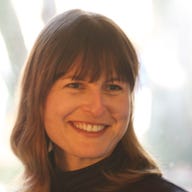Climate Group CEO on COP16 goals: 'The focus has shifted'

 Last week, The Climate Group, an international nonprofit organization, hosted the second annual Climate Week NYC, held alongside the United Nations General Assembly meeting. The forum was held two months before the U.N.’s climate talks in Cancun--COP16--giving global leaders an opportunity to network and discuss climate issues before November.
Last week, The Climate Group, an international nonprofit organization, hosted the second annual Climate Week NYC, held alongside the United Nations General Assembly meeting. The forum was held two months before the U.N.’s climate talks in Cancun--COP16--giving global leaders an opportunity to network and discuss climate issues before November.
During Climate Week, I talked on the phone with Climate Group Founder and CEO Steve Howard. He said we didn’t get a global climate agreement in Copenhagen last year, and we won’t get it in Cancun this year, so we need to make progress in other ways.
What’s the importance of getting global leaders together now, two months ahead of the U.N.’s climate talks?
It’s a fairly obvious reason. Last year was the first time we did Climate Week NYC, and we realized it would be an exceptional gathering, a shared sense of endeavor. We are a global networking organization. You probably never really get anything like the gathering of global decision makers as you do during [the U.N. General Assembly Meeting].
What has changed between the climate summit last year and what will happen this year?
The focus has shifted somewhat. The window of opportunity opened last year for a global deal, but we didn’t get a global agreement. We won’t get it in Cancun. We probably won’t get it in South Africa in 2011 either. We’ll make progress on chunks of it.
The common sense view now is to make progress on areas such as deforestation, because you can see big drops in emissions quickly. Ninety-five percent of the action will happen outside Cancun. So in Cancun we’ll bring together state leaders with the business community and talk about how to work together to deliver a zero carbon energy grid; how to get electric vehicles out on the road; and what we can get done without a legal agreement. That’s where the focus has shifted now--let’s focus on what the city of New York can do, or what HSBC or Cisco can do.
How important is the networking at an event like this?
How do you make a decision to buy an iPod? Someone shows you an iPod, and you say, “That’s cool,” and you buy one. With politicians—it’s peer to peer. If you’re asking, “How much risk am I about to take?” and if you see someone else has done it and gotten reelected, that’s important information. Politician s are will rapidly seize a good idea if they see they can move it forward. That’s the value of networking.
It’s really healthy to have a dialogue between business and government, such as the conversation about long-term durable business. They don’t want get-rich quick incentives because they will cause resentment in the marketplace. So there’s dialogue about what can you do that doesn’t have a cost associated with it.
Such as?
In some places there is so much bureaucracy. Ontario is doing this-one stop shop for approval, so rather than going to four different agencies for approval, you just go to one. If you’re shaving months and months off the approval process if you’re a business, you are turbo charging the process.
What is the message for developing countries?
There’s the opportunity to leapfrog in the developing world. The clear understanding is that this is no longer about costs; it’s about opportunities in the future. If you start to look at how much economic growth we will have in the next several decades, you say, OK, we need to reduce—or even stabilize—emissions. So it means thinking radically different. It’s not about an extra two miles to the gallon. It’s about electric vehicles. The message is, “Be bold. Think about the future.” Imagine no tailpipes left on vehicles driving through New York. Cars running on solar or wind power. That’s the future we will build. The question is can we do it fast enough.
What do you expect for Climate Week in 2011?
You just see things roll forward. Go back five years in the life of The Climate Group, and we had fairly broad strategies about what people intended to do. Now we’re about going to scale and renewables across economies, with 62 percent of new power generation in Europe last year coming from renewables. Alternative energy became mainstream energy. Electric vehicles is in earlier stage of development; LED lighting is in earlier stage of development. As we go through different cycles—conceptual to pilot to mainstream—the focus is on what we need to do to accelerate that process.
And then there’s just stuff we can’t predict. If you’d asked me five years ago if I’d really believe electric vehicles would potentially challenge the global market of gasoline vehicles I would have said, “No way.” Over next two to three years you can’t predict what we’ll see.
What’s the most interesting thing you’ve heard so far during Climate Week?
[Billionaire investor] George Soros saying he’d left this alone, as a philanthropist , thinking there were enough cooks in the kitchen. And when he went to Copenhagen, he realized this was a big enough problem that we all needed to be involved. He’s literally putting his money where his mouth is.
This post was originally published on Smartplanet.com